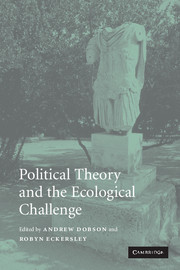9 - Justice
Published online by Cambridge University Press: 06 July 2010
Summary
Justice requires giving what is deserved. That in turn requires figuring out both what is deserved and who it is that deserves it. Here priority should be given to who it is that is deserving rather than what it is that is deserved. This is because the more there are who are deserving, other things being equal, the fewer good things each of them can deserve. Political philosophers have long recognised this priority when they are trying to determine what the human members of a particular society or state deserve; they have acknowledged that this question cannot be conclusively resolved without taking into account distant peoples and future generations as also deserving. Unfortunately, most political philosophers tend to stop there. Even environmentalists who argue for environmental justice and oppose the imposition of undeserved risks to health and wellbeing on people of colour usually start from an anthropocentric perspective; they do not take the next logical step of asking whether non-human living beings are also deserving. In this chapter, in a quest for a truly non-arbitary, non-question-begging conception of justice, I will ask that question and answer it in the affirmative. Having established that all individual living beings, as well as ecosystems, are deserving, I will go on to begin to establish what it is that they deserve.
The moral deservingness of all living beings
Most political philosophers, as I have indicated, are committed to anthropocentrism; they just assume without argument that all or only human beings are deserving or have moral status.
- Type
- Chapter
- Information
- Political Theory and the Ecological Challenge , pp. 148 - 164Publisher: Cambridge University PressPrint publication year: 2006



